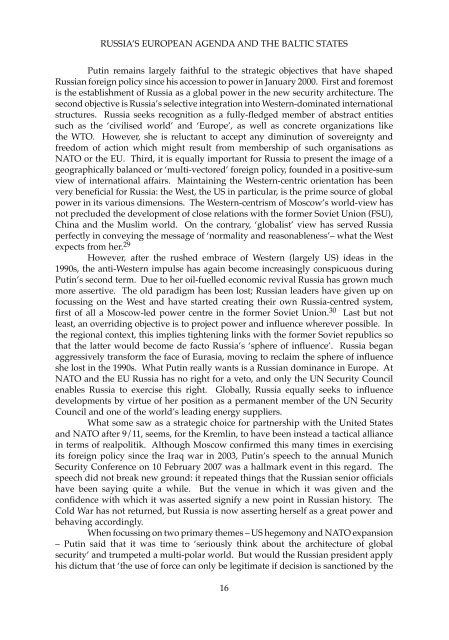Russia's European Agenda and The Baltic States - Defence ...
Russia's European Agenda and The Baltic States - Defence ...
Russia's European Agenda and The Baltic States - Defence ...
You also want an ePaper? Increase the reach of your titles
YUMPU automatically turns print PDFs into web optimized ePapers that Google loves.
RUSSIA’S EUROPEAN AGENDA AND THE BALTIC STATES<br />
Putin remains largely faithful to the strategic objectives that have shaped<br />
Russian foreign policy since his accession to power in January 2000. First <strong>and</strong> foremost<br />
is the establishment of Russia as a global power in the new security architecture. <strong>The</strong><br />
second objective is Russia’s selective integration into Western-dominated international<br />
structures. Russia seeks recognition as a fully-fledged member of abstract entities<br />
such as the ‘civilised world’ <strong>and</strong> ‘Europe’, as well as concrete organizations like<br />
the WTO. However, she is reluctant to accept any diminution of sovereignty <strong>and</strong><br />
freedom of action which might result from membership of such organisations as<br />
NATO or the EU. Third, it is equally important for Russia to present the image of a<br />
geographically balanced or ‘multi-vectored’ foreign policy, founded in a positive-sum<br />
view of international affairs. Maintaining the Western-centric orientation has been<br />
very beneficial for Russia: the West, the US in particular, is the prime source of global<br />
power in its various dimensions. <strong>The</strong> Western-centrism of Moscow’s world-view has<br />
not precluded the development of close relations with the former Soviet Union (FSU),<br />
China <strong>and</strong> the Muslim world. On the contrary, ‘globalist’ view has served Russia<br />
perfectly in conveying the message of ‘normality <strong>and</strong> reasonableness’– what the West<br />
expects from her. 29<br />
However, after the rushed embrace of Western (largely US) ideas in the<br />
1990s, the anti-Western impulse has again become increasingly conspicuous during<br />
Putin’s second term. Due to her oil-fuelled economic revival Russia has grown much<br />
more assertive. <strong>The</strong> old paradigm has been lost; Russian leaders have given up on<br />
focussing on the West <strong>and</strong> have started creating their own Russia-centred system,<br />
first of all a Moscow-led power centre in the former Soviet Union. 30 Last but not<br />
least, an overriding objective is to project power <strong>and</strong> influence wherever possible. In<br />
the regional context, this implies tightening links with the former Soviet republics so<br />
that the latter would become de facto Russia’s ‘sphere of influence’. Russia began<br />
aggressively transform the face of Eurasia, moving to reclaim the sphere of influence<br />
she lost in the 1990s. What Putin really wants is a Russian dominance in Europe. At<br />
NATO <strong>and</strong> the EU Russia has no right for a veto, <strong>and</strong> only the UN Security Council<br />
enables Russia to exercise this right. Globally, Russia equally seeks to influence<br />
developments by virtue of her position as a permanent member of the UN Security<br />
Council <strong>and</strong> one of the world’s leading energy suppliers.<br />
What some saw as a strategic choice for partnership with the United <strong>States</strong><br />
<strong>and</strong> NATO after 9/11, seems, for the Kremlin, to have been instead a tactical alliance<br />
in terms of realpolitik. Although Moscow confirmed this many times in exercising<br />
its foreign policy since the Iraq war in 2003, Putin’s speech to the annual Munich<br />
Security Conference on 10 February 2007 was a hallmark event in this regard. <strong>The</strong><br />
speech did not break new ground: it repeated things that the Russian senior officials<br />
have been saying quite a while. But the venue in which it was given <strong>and</strong> the<br />
confidence with which it was asserted signify a new point in Russian history. <strong>The</strong><br />
Cold War has not returned, but Russia is now asserting herself as a great power <strong>and</strong><br />
behaving accordingly.<br />
When focussing on two primary themes – US hegemony <strong>and</strong> NATO expansion<br />
– Putin said that it was time to ‘seriously think about the architecture of global<br />
security’ <strong>and</strong> trumpeted a multi-polar world. But would the Russian president apply<br />
his dictum that ‘the use of force can only be legitimate if decision is sanctioned by the<br />
16

















